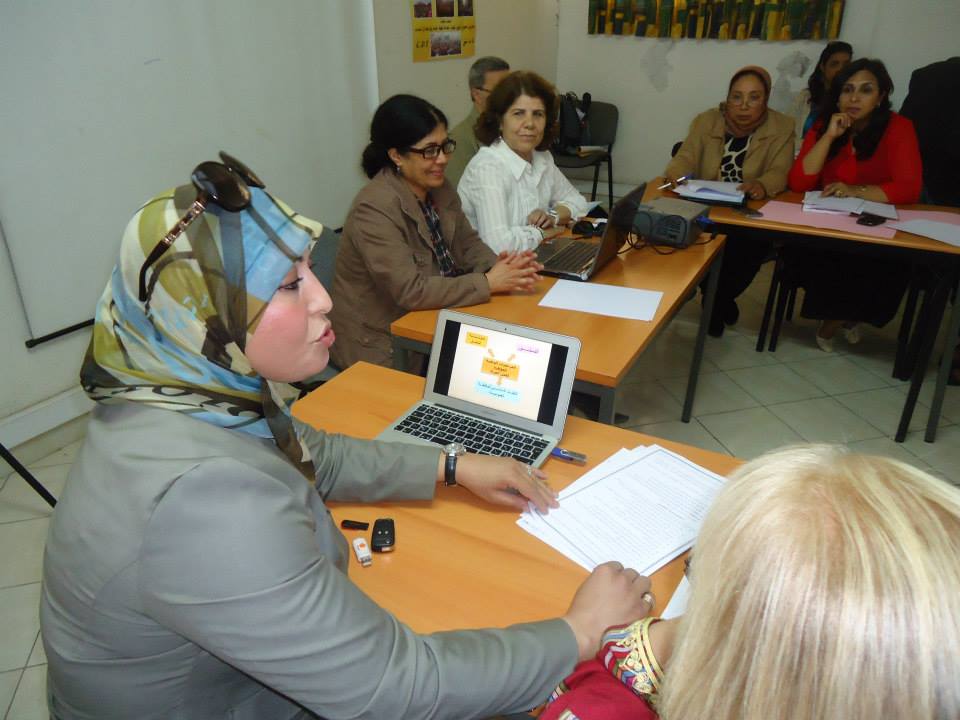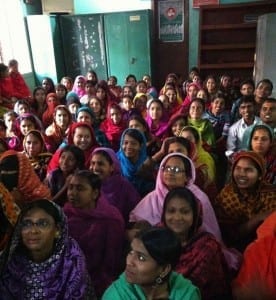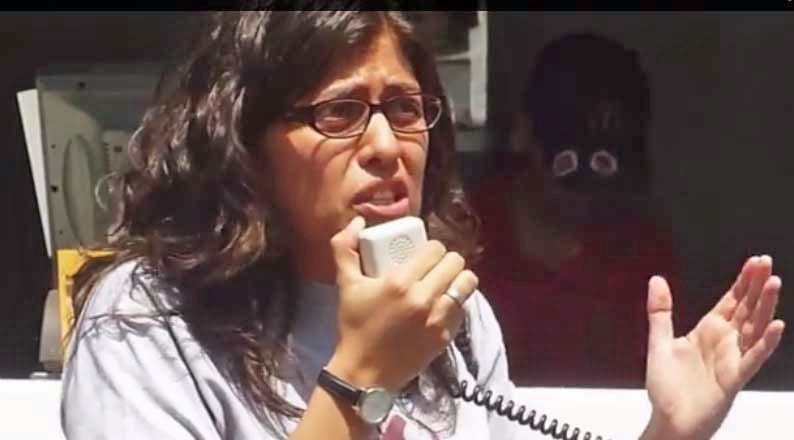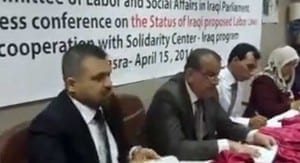
May 16, 2014
On a late September day in the Niger Delta region of Nigeria, hundreds of women from the Egberu, Afam-Ukwu and Afam-Nta communities gathered in Oyigbo.
They had repeatedly tried to talk with the local government council about their dire need for a functional health center but had been ignored. With no health facilities nearby, access to medical care required traveling long distances, a costly expense few impoverished residents could afford, and a journey that further endangered the health of women and their children.
The women marched to the council building that day in 2011 to demand the government meet with them. The council secretary instructed security to lock the gates, but as the guards tried to barricade them, the women pushed the gates open, singing as they did.
They would be heard. Because of their persistence, the council chief of staff met with them and, at their request, asked the state to renovate and update the area’s dilapidated health clinic. The government also built a well-equipped health center at nearby Obuakpu, achievements carried out by community women empowered through a dynamic community coalition, Women Initiative for Transparency and Social Justice (WITSOJ).
Born out of necessity to combat injustices in the Niger Delta, WITSOJ is training and mobilizing women and young people to effectively engage in the democratic political process, hold local lawmakers accountable and achieve concrete goals in their communities. WITSOJ formed in 2007, after a Solidarity Center workshop in Warri, a major oil city in Delta State.
“Women from all Niger Delta states were represented, and we were asked to go back to our communities and ask for social justice,” says Dr. Jennifer Spiff, who heads the organization. Following the Solidarity Center training, more than 200 women from a variety of organizations and communities met in Port Harcourt, and from there, the coalition reached out to additional women-based organizations. Spiff was interviewed as part of a new Solidarity Center report, “Nigeria: Empowering Women, Transforming Society.”
WITSOJ works closely with the national trade union movement, especially with Women in PENGASSAN (the Petroleum and Natural Gas Senior Staff Association of Nigeria). PENGASSAN members have called for transparency in the government’s handling of profits from its vast oil reserves, demanding that oil income fund infrastructure repair and create environmentally safe refineries. The union’s deep roots in local communities adds credibility to WITSOJ. The partnership with the union “gives WITSOJ the leverage to be trusted as an organization owned by the masses,” says Spiff.
Ceciliar Anthony, a farmer who lives in the Kpor community with her husband and three children and who took part in a community campaign for clean drinking water, says “WITSOJ activities brought responses from the leaders who have made firm promises for the first time.”
As a coalition of more than 20 local organizations, WITSOJ regularly taps into the expertise of its members and has the support of clergy. WITSOJ focuses on training women in large part because “women are the most vulnerable and are on the receiving end of social injustice,” says Spiff, WITSOJ coordinator.
“WITSOJ has made women realize the need for gender equality, and that most times, women can become as good ambassadors in leadership as their male counterparts,” says Gold Minimah, an active WITSOJ member.
Victory Goodluck, a farmer from the Ihuike community who has taken part in WITSOJ workshops, agrees. “It is a good strategy to focus on women because women are instruments of change, and WITSOJ has enlightened us to know our rights and the power of women in bringing our desired vision into full manifestation.”
This article is an excerpt from the report, Nigeria: Empowering Women, Transforming Society.” The report is part of Catalysts for Change, a Solidarity Center series supported by the National Endowment for Democracy. The series features the working people, their unions and activists who are advancing worker rights and greater equity in their societies. Their experience and efforts provide real, transferable lessons for others seeking to affect positive change.

May 13, 2014
In Algeria, Tunisia and Morocco, women are taking concrete steps through unions to achieve social and economic justice and decent work, achievements possible when women are substantively involved in decision-making in their unions, their community and civil society.
In Algeria, the Women’s Committee of the Syndicat National Autonome des Personnels de l’Administration Publique (SNAPAP) has reached out to 600 marginalized and vulnerable women across 11 provinces through educational outreach and study circles. SNAPAP leadership recognizes that despite women’s active social and economic participation, they still face blatant discrimination in their workplaces and communities, harassment, violence, and exploitation on the job.
The Women’s Committee runs study circles with the Regional Algerian Women’s Legal Empowerment Network and with support from the Solidarity Center. During study sessions, the women learn their legal rights under national laws and international conventions. They also are supported in overcoming fears that keep them from challenging repression and violations of their rights, even those often condoned by their societies.
Amid ongoing global economic insecurity, millions of workers are struggling to find jobs that pay a living wage—and the most vulnerable are women, who are more likely to toil in jobs without coverage under formal labor law or social protections, leaving them open to discrimination and exploitation.
The study circles provide a safe place where women can freely talk about their experiences. In recent months, they have described ongoing exploitation in the workplace and at home. All have detailed low wages, long working hours, abusive transfers and dismissals, discrimination, sexual harassment, physical violence and a lack of social protection.
A woman union activist from Adrar, in southwest Algeria, describes how women workers struggle economically in the region, despite the country’s oil and gas wealth. To survive in Adrar, some women work in stone quarries using their bare hands to fill trucks with rocks and gravel for private sellers. Three women recently died from dehydration.
“Surprisingly, all the basic rights that women should enjoy, such as health coverage and decent living wages, are not being enjoyed by women of the south. Some women tried to change their situation through training, but their certificate of completion was rejected by all the businesses and enterprises in the south, which led women to be marginalized,” said the activist. She added that the women, “work in an unsafe environment and are vulnerable to harassment.”
In Tunisia, where women are playing a key role in enshrining articles in the constitution that guarantee equality and parity, women in the Union Générale Tunisienne du Travail (General Union of Tunisian Workers, UGTT) are now working to advance women’s roles in their union. They are uniting under the theme, “Partners in social activism, partners in decision-making,” to highlight their essential role in the country’s 2010–2011 uprising and the subsequent democratic transition. UGTT women are campaigning for creation of a quota that would ensure women comprise a minimum percentage of elected officers and members of UGTT decision-making bodies.
Women union members also have been active in UGTT’s push to remove all of the country’s reservations to the United Nations on the Convention on the Elimination on all Forms of Discrimination against Women (CEDAW). These reservations had enabled Tunisia to opt out of certain provisions, including women’s rights within the family, even though the country had ratified the treaty.
The Confederation Democratique du Travail (Democratic Labor Confederation, CDT) in Morocco is laying the groundwork for a gender advocacy campaign to ensure the consistent application and enforcement of women’s rights. The CDT’s Women’s Committee is laying the groundwork to “give more visibility to the demands of women workers.” The CDT released a memorandum, “Work is a right, with guaranteed dignity and equality,” at a well-attended press conference last month and plans a coordinated workers’ advocacy campaign for women workers.
Apr 28, 2014

Bangladesh union activists met in Dhaka days before a garment worker and union organizers were attacked. Photo: Tim Ryan
Bangladeshi union organizer Hasina Akter was talking with garment workers in Dhaka when a group of at least 20 people accosted her and the three other union organizers and a worker leader with her. She and her companions were threatened and beaten, one into unconsciousness. Two organizers had to be hospitalized following the assault, and the factory worker went into hiding.
The February attack was not an isolated incident. Union organizers in Bangladesh are in constant peril, and these brave women and men need your help.
Your tax-deductible contribution to the Bangladesh Worker Rights Defense Fund will support Bangladesh garment organizers and worker-activists as they help workers who toil in unsafe factories for unfair—or unpaid—wages and who, without a union, cannot exercise their rights. Activities your donation may support include:
• Medical care following an attack
• Safe spaces for organizers and their families who must go into hiding
• Legal assistance
• Transportation
• Awareness-raising activities regarding attacks on worker rights
• Replacement of belongings stolen during assaults
Your receipt for supporting Bangladesh organizers and activists will indicate The Solidarity Center Education Fund. The Fund is a tax-exempt charitable organization under section 501(c)(3) of the Internal Revenue Code. Your contribution is tax deductible to the extent allowed by governing laws. In addition, pursuant to the Internal Revenue Code requirement stated in Internal Revenue Service publication 1771, no goods or services were provided in return for this contribution.

Apr 24, 2014
Alejandra Ancheita, founder and executive director of the Mexico City-based ProDESC (Project for Economic, Cultural, and Social Rights), is one of three finalists for the prestigious international Martin Ennals Award for Human Rights Defenders.
Ancheita, a Mexican lawyer and activist who leads the fight for the rights of vulnerable and excluded workers, migrants, communal landowners and indigenous communities, founded ProDESC in 2005. ProDESC is a long-time Solidarity Center ally whose work includes an ongoing campaign seeking justice for miners denied their right to organize for improved working conditions at the La Platosa mine in La Sierrita, Durango, Mexico.
“Alejandra is an unsung hero. She stands up in the face of widespread violence and impunity in Mexico—often risking her life so that Mexican workers can have justice,” said Solidarity Center Executive Director Shawna Bader-Blau. “Alejandra’s difficult and important work shines a spotlight on abuse and exploitation that generally goes unnoticed. We hope this honor helps diminish the risks she and her colleagues face every day.”
The Martin Ennals Award for Human Rights is selected by the international human rights community and given to human rights defenders who have shown deep commitment and face great personal risk. Members of the organization include Human Rights Watch and Amnesty International.
Watch a video about Ancheita.
Apr 21, 2014

Labor Committee Vice President Salih Al Asady (second from left) speaks at a press conference held by Iraqi unions
Iraqi trade union leaders and members are keeping the spotlight on Parliament, urging lawmakers to pass a trade union law that has been pending since January.
Some 82 unions members and leaders from all Iraqi trade unions, with support from the Solidarity Center, held a press conference in Basra April 15, their latest effort to secure passage of the law. If passed, it would provide first-ever worker rights protections in line with core labor standards, including freedom of association.
In a demonstration of solidarity, the Kurdistan United Workers Union (KUWU) sent two delegates to the event, which also included the head of Parliament’s labor committee.
Union representatives also raised concerns over the scope of the law, which does not cover public-sector workers. Labor Committee Vice President Salih Al Asady, who took part in the event, said he would bring the issue to Parliament. He also urged the Iraqi union leaders and members to continue to show their strength through rallies and other campaign actions to push lawmakers to vote on the law before this session ends. Elections are scheduled April 30, and the current Parliament will remain in session until June 15.
Parliament has voted on 46 of 157 articles, however the remainder have been unable to be voted on due to an insufficient number of members of Parliament showing up to each session, though the law continues to appear each day on the agenda. This is the result of political conflicts, in particular around the inability of the parliament to pass the budget law.
Six major Iraqi labor unions, together with the Solidarity Center, have worked since June 2012 to bring proposed changes to the nation’s draft labor law in line with International Labor Organization (ILO) conventions. Workers are still subject to labor laws from the Saddam Hussein era.
Watch a video of the event (in Arabic).





